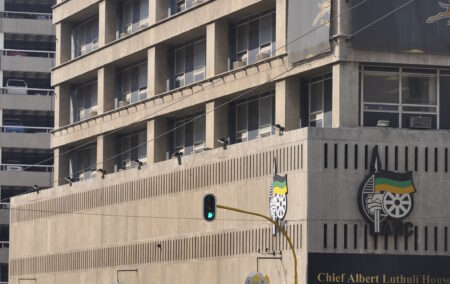Many commentators have criticised President Cyril Ramaphosa for not using his SONA speech last week to lay out a concrete plan for his supposed ‘new dawn’. But the often empty rhetoric that characterised the CR speech does not mean that the ANC/SACP alliance lacks a plan for the next five years.
In fact, its overarching plan is to ‘advance, deepen and defend’ the National Democratic Revolution (NDR), with its socialist and ultimately communist aims. This NDR plan could not be acknowledged in the SONA without undermining the empty reassurances (‘dexterity in tact’, in NDR speak) the ANC is currently intent on providing.
The key objective of the NDR plan is to take the country ever closer to a ‘socialist’ economy: one in which ‘capitalism is still present’, but ‘the socialised sector is dominant and hegemonic’ and is ‘premised on meeting social needs and not private profits’. This overarching goal is underpinned by a number of subsidiary aims.
The first of these subsidiary aims is to keep weakening property rights, so as to prepare the way for the eventual ‘elimination’ of existing ‘property relations’. Dexterity in tact presently requires an emphasis on land reform, rather than on expropriation without compensation (EWC). But the mooted EWC constitutional amendment, backed by the Expropriation Bill of 2019, will doubtless be resuscitated and pushed through Parliament once the ‘balance of forces’ is more favourable.
A second subsidiary aim is to ‘demonopolise’ the economy and so confront ‘the primary enemy’ of the NDR. This enemy is, of course, ‘monopoly capital’ – defined by the ANC at its Nasrec national conference in 2017 as ‘local and foreign corporations controlling large chunks of the economy’.
‘Demonopolisation’ is to be achieved – under the Competition Amendment Act pushed through Parliament in 2018 and signed into law in February 2019 – by getting the competition authorities to order the divestiture of the shares or assets of big companies in sectors deemed to be highly concentrated.
Under this Act, divestiture may be ordered – not because of any abusive or prohibited practice on the part of the company concerned – but simply because of the degree of concentration in a given market and the risk that this might adversely affect BEE entrants.
Thus far, the evidence of high concentration assembled by the Competition Commission (in the financial sector and the retail grocery sector, for example) has been flawed and unconvincing. Big companies may thus be broken up without any semblance of sound reason. This will supposedly help ‘open up the economy for SMEs and black entrepreneurs’, says Ebrahim Patel, now minister of trade and industry. But the real aim will be to weaken the private sector and increase state control over a faltering economy.
(By contrast, the demonopolisation of Eskom, Transnet, Prasa, and other state-owned enterprises is not required, as the SACP explains, because ‘public monopolies’ already ‘belong to the people as a whole’.)
A third subsidiary aim is to roll back the capitalist market by ‘decommodifying’ basic needs, such as healthcare, education, housing, transport, and social security. In NDR thinking, these needs should not be treated as ‘commodities’. Nor should their ‘availability and price [be] determined by a profit-maximising capitalist market’.
This explains the ANC/SACP determination to press ahead with the destructive and unaffordable National Health Insurance (NHI) scheme. Under the NHI, there will be only one state-run medical aid for the entire country (the NHI Fund), into which all other medical schemes will be folded. In addition, the ANC/SACP alliance will then control every aspect of health care, from the prices to be charged by private practitioners to the medicines and health technologies to be permitted.
A fourth subsidiary aim is to ‘challenge the monopoly of management and capital over investment and other strategic decisions’. This is what underpins the ANC/SACP plan to increase state control over the country’s pension funds, in which roughly 12 million South Africans have accumulated pension savings worth some R4 trillion. This also explains why the ANC is ‘investigating’ the introduction of ‘prescribed asset’ rules, under which pension funds would be obliged to invest in Eskom and other failing SOEs, or in industrialisation or other projects deemed sufficiently ‘developmental’.
A fifth subsidiary aim is to ‘bring macroeconomic policy into line’ with ‘the developmental agenda’. This, says the SACP, will put an end to the ‘isolated single-minded mandate’ of the South African Reserve Bank (SARB), which ‘is a limitation to many other possible interventions’ and leaves too much ‘in the hands of the markets’. This aim explains the ANC’s Nasrec decision to nationalise the SARB and change its constitutionally-sanctioned mandate to ‘align’ this with ‘the objectives of the second phase’ of the NDR.
A sixth subsidiary aim is to use the vast powers of the state to achieve these various goals. Since the changes needed to advance the NDR will not happen either ‘spontaneously’ or ‘willingly’, as the SACP puts it, various enforcement measures will be needed. These range from increasing worker power on the shop floor to ‘state-led strategic planning, state-provided incentives, and effective state…regulation’, along with ‘straightforward compulsion and even expropriation’.
This takes us back to the EWC constitutional amendment to be introduced once the time is ripe. It also explains why the failures of land reform have never been more than a fig leaf for a crucial aspect of state power the ANC/SACP alliance has long been determined to obtain.
Dr Anthea Jeffery is the Head of Policy Research at the Institute of Race Relations. She is also the author of People’s War: New Light on the Struggle for South Africa, now available in all good bookstores and as an e-book in abridged and updated form.
If you like what you have just read, become a Friend of the IRR if you aren’t already one by SMSing your name to 32823 or clicking here. Each SMS costs R1. Terms & Conditions Apply.

